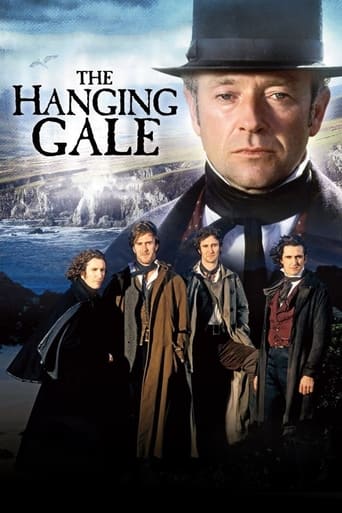MRavenwood
I am partial to stories that teach something or reveal something to me as a life lesson. No one in this story learns any lessons. They all pointlessly reject offers of help and solution until it is too late. Not only is it not uplifting or bittersweet, even, it's hard to follow! All you can realize is how unhappy, ungrateful, stupid, and hate-filled everyone is. The most sympathetic character is the Agent, Townsend (played by the riveting Michael Kitchen) who is tasked with upholding unjust laws and has no means of protecting himself or the tenants he tries to do some good for. Apparently, this is based on some facts from the family history of the McGann family who star in this production. An unrewarding viewing experience. Lots of tears, threats, and hand wringing.
mmilliken47
One of the things that makes this series great, instead of just really good is the nuanced performance by Michael Kitchen of the conflicted land agent. This man is a truly fantastic and totally underrated actor. It would have been an easy cliché to make the land agent a total monster, but instead he is very human, but also has an ugly job to do. The scene in which he tries to connect with the servant girl Mary by telling her about his years in India and issues with Lord Cardigan, while not the most dramatic, is poignant. He's lonely and trying to connect with a girl who has no idea what he's talking about and just wants to get out of the room. Very subtle and nicely done.
jefurey
Let's not get carried away with calling it a pan-European blight. England isn't the villain, but the RM (played by Kitchen) is an agent not just of the Landlord but of the English government and its Laissez faire procedure. That's what I like about it - there's no blatant condemnation, but one gets the feel of what the Irish, supposedly full members of the Act of Union, really got from the powers that be along with their own share of greed and folly. It touches on the social, political, and most importantly, moral situations confronted by these benighted folk. Although it does not show the horrors of the workhouses, it does portray the idiocy of the 'works' projects. Most spectacularly, we see how family, the mainstay of Irish culture, is brought to its knees and nearly destroyed totally. It's also one of the few films where women in seemingly minor positions display amazing feats of strength, both physical and spiritual. Probably the most balanced film on this subject to date.
annieoz
Great ensemble piece not only for the McGanns but for a group of strong Irish actors (plus the estimable Michael Kitchen) this is an unflinchingly close up view of the effects of the pan-European potato famine in one tiny portion of the north of Ireland.The script wisely avoids casting the English as "the villains" - rather it is the system of absentee English landlords and local grasping profiteers who break the community up. The crossfire of politics, starvation and government indifference creates enormous suffering, graphically portrayed and stunningly contrasted with the wild and romantic scenery.
Every descendent of the Irish diaspora should have a copy of this at home. But I'd recommend it to everyone.


